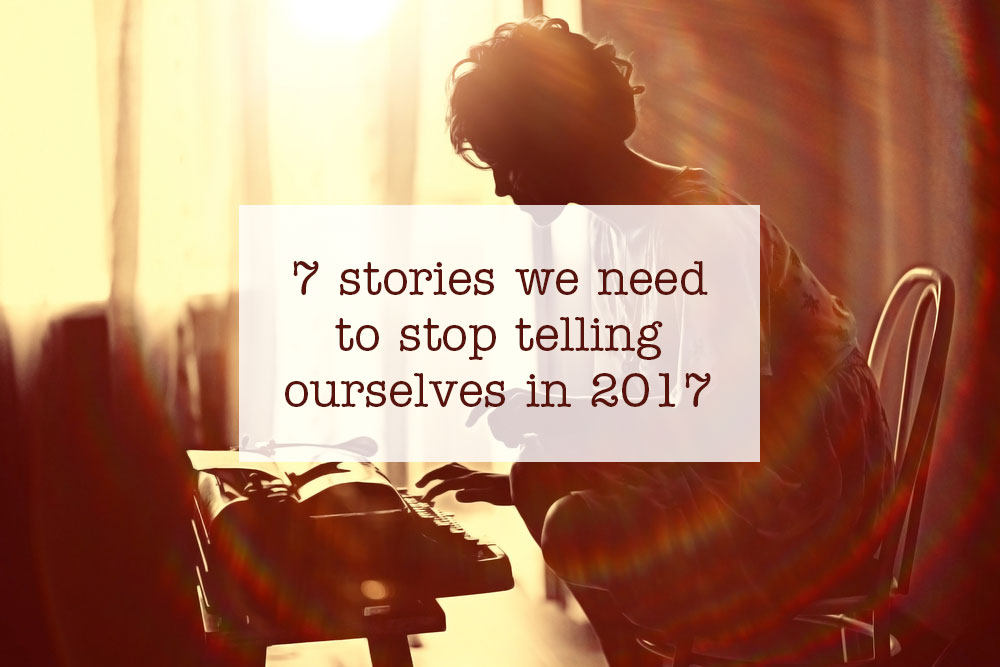
I’ve a long-held fascination with the power of the stories we tell ourselves. How those stories are built out over time. How they shape our identities. How they can both limit and expand our potential.
Last week, in one of the many ‘Year in Review’ type posts doing the rounds at the moment, I saw these questions:
What is one story you will stop telling yourself in 2017? What new story will you replace this with?
Captivated, I put them out to my readers. My intention was to share a selection of their answers here for your inspiration, but after reading through over 80 responses, I could see seven common ‘story’ themes emerging:
1. I’m not …
“I’m not a strategic thinker. I don’t know how to plan ahead and think strategically about my business and my life. I just respond to what’s going on.”
“I’m not good enough. I’m not worthy. I’m a failure. I’ve let everybody down. I suck.”
“I’m not credible enough to be successful and to make the kind of money that I want.”
“I’m not a morning person.”
“I’m not good enough to call myself a writer, despite having two books out there now.”
“I’m not very good at my job (or good enough/as good as others).”
2. Life will be better when …
“Life will be better when things are a little less crazy around here. The only thing is, when one craziness comes to an end, the next begins.”
“Life would be easier if I lived in Melbourne … I would have more friends, and I would be happier.”
“For the past two years I’ve told myself that I will be happier if I lose those extra ten pounds.”
“I can start living my life when I lose some weight.”
3. I have no control over my life
“The biggest story of mine that fits the bill is that the universe is somehow working against me. I’ve had a pretty disappointing year on many levels, and I’m well aware that reverting to ‘poor me’ mode is in no way beneficial. Unfortunately, it has lately become the default.”
“I’m trapped in my situation as it is and therefore, as much as I’d like to I can’t change things.”
“I’m a victim of my work circumstances and cannot make a change to improve my job or career/income as I am stuck. There are no options in the immediate future.”
“Things will always be the same and I haven’t got the energy, time or will to change the direction in which I’m headed. I shouldn’t upset the applecart.”
“I need approval or permission from others to do things that are just for me.”
“I’m stuck. Due to health. Due to my age. Due to my weight. Due to my skills. Due to my height. Due to my fears.”
4. I can do it all/have it all
“I have to do everything, and do it all ‘perfectly’, or not do it at all. (All while knowing that doing nothing is not an option, but also knowing perfection is out of reach.)”
“I’ve just got to keeping pushing on and everything will be ok in the end.”
5. I can’t …
“I can’t risk trying things because the impact (if it doesn’t work – and I don’t trust myself that it will) will be too detrimental to my family.”
“I can’t walk away from this marriage, even though I know it’s not good for me to stay.”
“I can’t go back to work because my children still need me, and only me, to have the best.”
6. I should …
“I should be able to moderate my alcohol consumption.”
“I should be happier.”
“I should want to spend all of my time with my kids.”
“I just hate the way using Instagram and Facebook too much makes me feel I’m not living life the right way or have the right handbag or getting on board the next crafty pursuit that everyone’s doing.”
“This past year I have been feeling like I’ve been completely failing at life, and have gotten stuck in a spiral of comparing myself to other people who are seemingly doing everything so perfectly and feeling like I am not enough.”
7. It can wait
“When the timing is right I’ll: eat healthier/exercise/parent more positively/respect my husband more/play more games with the kids/grow a veggie garden …”
“I stopped exercising. I told myself that I didn’t need to do it if I didn’t want to. And I didn’t want to. Well, is it any wonder that I spend half the year sick? The lack of fitness encouraged a lack of motivation, which in turn instigated laziness. And that all lead to depression and increased anxiety.”
“I have been telling myself that my life is too busy, I have so much pressure on me in my workplace, study and home. This year has resulted in me quitting the gym (of course I had to let something go), rarely catch up with friends and family and ultimately found my role was made redundant. By the beginning of November, I had reached a point of adrenal exhaustion.”
“I’ll start it tomorrow.”
There were more stories of course
Stories of shame, regret, comparison-itis, lack of self-worth, denial … But the seven above were the main themes that emerged from the stories people shared with me. Those people also shared what they intended to do in 2017 to change those stories, and every single one was inspiring in their determination to shift their thinking about a mindset that wasn’t working for them. From those intentions also sprung commonalities …
Five steps towards changing the stories that limit your potential and happiness
1. Identify the story
To change a story, you must first nail down exactly what it is, and why you want to change it. Ask yourself:
- What’s the story that’s limiting me? As an example, a story I’ve told myself a lot in 2016 is “I’m doing the best I can.”
- How is it limiting me? That story was limiting because I consistently used it to shut down (usually) warranted criticism on the home and work front.
- Where did it come from? It was born out of the emotional exhaustion of this year. Which meant anywhere I saw the opportunity to shut down a hard conversation; I took that opportunity.
2. Determine whether the story is based in truth
Sometimes it isn’t. (No, you’re not a bad mum because you don’t like playing games with your kids.)
Sometimes it is. (Yes, you are a procrastinator and yes, this does lead to you rushing things that require more than ‘last minute’ attention.)
Sometimes part of it is. (Yes, life is throwing a lot of shit sandwiches your way right now, but, there are still things you can control.)
The story I want to change (“I’m doing the best I can”) is based in truth because in 2016 I was doing my best. But, as previously mentioned, instead of using that story to be kind to myself (positive), I was using that story to excuse sub-optimal performance and behaviour (negative) and shut down hard conversations.
Knowing whether the story you’re telling yourself is based in truth or not gives surprising power over it. Which provides a nice springboard for change.
3. Decide how you want to change the story
In other words, what’s a better story?
Replace: “I’m a failure.”
With: “I can try my hand at things and fail, but I, myself, am not a failure.”
Replace: “I never have any time for xxx.”
With: “I do have time for xx. I’m just not prioritising it,” or “If I’m not making time for xxx, perhaps it’s not as important to me as I thought it was.”
Replace: “I will be happier when I lose weight.”
With: “When I lose weight I will be the same person I am now. Here are the things I need to change to be happy now while working towards being a healthier version of me.”
Replace: “I’m doing the best I can.”
With: “I can credit myself for doing my best whilst being open to constructive criticism that points out I can be better.”
4. Figure out who can help you
If you’re reading this blog, chances are you’re a highly-driven, type A over-achiever who thinks you should be able to sort your shit out yourself. Which is easily one of the worst stories you can tell yourself.
If you’re serious about changing a particular story, you must get help and set up support structures for yourself. It might be an accountability buddy. It might be getting your kids to do certain things around the house or filling your partner in on what they can do to help. I highly highly recommend speaking to a therapist, however. Friends and family are great at listening, but therapists help you with concrete strategies for managing challenges when they arise. Strategies that won’t just help with changing one story; they’ll be with you for life.
5. Give yourself time
I’ve been there. When I want to change something, I want to change it Right. Now. I go hard for a week and then, at the first sign of regression or things getting hard, I decide ‘The time clearly isn’t right to make this change’ (a story), or ‘I don’t have it in me to make this change’ (yet another story).
Here’s a better story: the one where I gave myself permission to make change slowly and in doing so lost weight, got my mental health back on track, and eventually, got my whole life back on track.
When you give yourself time, you’re able to make your change incrementally. Which allows you to be more consistent. You’re kinder to yourself when regressions happen (and they will happen). And you get yourself back on track quicker, with less negative self-talk.
Don’t wait till things get dire before changing your story
There are two situations where I’ve seen people change their story in a heartbeat:
- When the ‘non-useful’ story they’re telling themselves is relatively new and they have the self-awareness necessary to change that story quickly before it becomes entrenched.
- When they’ve run themselves into a situation so dire they have no choice but to make change fast.
I’ve been in situation number 2. And I’ve had countless people write to me and tell me that getting cancer changed everything for them on a dime. Which is why of the biggest goals of this blog is to help people make necessary changes before they’re forced to.
When things aren’t dire and you hit that first roadblock in changing your story, there will be a huge temptation to quit; to do it ‘another time’ or ‘when the timing is right’. The best time to make a change is right now. Start small. Be kind to yourself. But keep moving forward. You will stunned at how quickly small steps done daily add up to something big.
“We are the stories we tell ourselves … the stories we tell ourselves are the stories that define the potentialities of our existence.”
~ Shekhar Kapur

